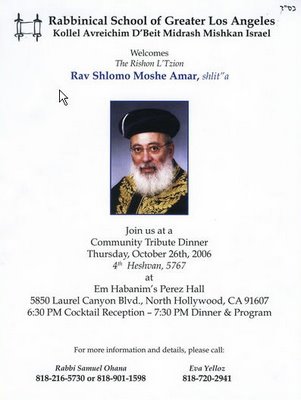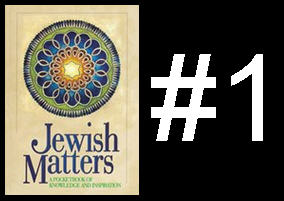 Jewish Matters No. 2
Jewish Matters No. 2As
promised earlier, here is the second of a 6-part series from "Jewish Matters" by Doron Kornbluth.
World Perfect
Ken SpiroKEN SPIRO is a senior researcher and lecturer at Aish HaTorah’s popular Discovery seminars in Jerusalem and around the world. His master’s degree and strong interest in Jewish and world history form the basis for the information in this essay, and he is the author of a soon-to-be published book on the Jewish impact on civilization.What would it take to make a perfect world?
If you ask almost anyone today, chances are that the answers will fall into the following six categories:
1. respect for life
2. peace and harmony between nations
3. justice and equality under the law
4. accessible education for all
5. family stability
6. social responsibility
People tend to link these values with democracy. But did they actually evolve from a democratic source?
A brief glance at the Greeks, who invented democracy, and the Romans and virtually all other ancient societies, shows us that we did not get our values from them.
Ancient Hypocrisy1. Respect for Life
The basic right to life seems fundamental. We all want to live without fear of being arbitrarily deprived of life or dignity. As obvious and important as this seems to us today, however, it was not obvious or important in the ancient world.
The ancient Greeks and Romans, as well as every ancient culture we know of, practiced infanticide — the killing of newborn children as a means of population control, sex selection (boys were desired, girls not), and ridding society of burdensome or deformed members.
Babies that appeared weak or sickly at birth, or had even a minor birth defect or imperfection such as a cleft palate or harelip, were killed. This was not done by some Nazi-like baby removal squad, but by an immediate member of the family, usually the mother or father, often using methods that betray a cruelty beyond our modern imagination.
Wrote the great humanitarian Seneca: “Children . . . weak and deformed we drown, not through anger, but through wisdom, preferring the sound to the useless.”
These societies also practiced human sacrifice and — when it came to the Romans — killing for entertainment. The Coliseum, and other circuses of its type, saw a level of cruelty and inhumanity beyond belief. Emperor Trajan, in the year 107 B.C.E., held games where ten thousand gladiators and three thousand wild animals fought to the death — which means thousands of human beings died — watched by spectators who ate, drank wine, and cheered the grisly spectacle.
2. Peace and HarmonyToday we understand that peace is vital to the future survival and development of humanity. Yet the Greeks and Romans built great empires by conquest. With no stigma attached even to killing for sport, killing in war wasn’t worth raising an eyebrow. Indeed, the fellow who killed the most was the hero, the celebrity of his day.
3. Justice and Equality
We, who have grown up in liberal, democratic societies, realize that justice and equality are fundamental principles, that all people have the right to be treated equally under the law, regardless of who they are. But the Greek inventors of democracy didn’t believe in equality. Citizens voted, but only land-owning adult males qualified as citizens. Slaves and women had no rights and could be subjugated by the power elite.
4. EducationWe view free education as one of the basic responsibilities of any government toward its citizens. But in the ancient world this one ranked in the you-gotta-be-kidding category. Historians estimate that that more than 99 percent of all humanity has been illiterate. There were good reasons why education was reserved for the elite: ignorant masses are easier to control.
5. Family StabilityWe appreciate today that having a stable family structure is one of the basic building blocks for a stable, healthy society. But Greek and Roman society were characterized by a disdain for women and a freewheeling obsession with sexuality. Men married women only to produce male heirs. Wrote the Greek poet Palladas: “Marriage brings a man only two happy days. The day he takes his bride to bed and the day he lays her in her grave.”
The epitome of love in these ancient societies was pedastry — a sexual relationship between an older man and a young boy; today it is a very serious felony. To the Greeks this was something positive and beautiful. All the Greek greats — Sophocles, Aeschylus, and Plato, for instance — had young boy lovers. And many waxed ecstatic about it, such as the Greek poet Propertius: “May my enemies fall in love with women and my friends with boys.”
Sexual promiscuity eventually had such a detrimental effect on these societies that both the Greeks and Romans eventually passed laws requiring men to marry. Yet these laws ultimately failed. When Rome collapsed in the fifth century B.C.E. it could not field an army and had to rely on mercenaries. The birth rate had plummeted, and they had no people left to fight for them. The greatest empires fell from the inside: internal rot, largely due to uncontrolled sexual behavior, helped bring about their fall.
6. Social Responsibility
Societies that did not value life, equality, or justice were not going to put much effort into social welfare programs to help those in need. No welfare checks, no soup kitchens, no food stamps. Two thousand years ago Rome, the great metropolis of 1.5 million people, the largest city on earth at the time, did not have one public hospital, asylum, or shelter.
So that is the ugly underside of Greek and Roman civilizations. This doesn’t mean that all individuals were bad. Joe Average was just trying to make it through the day. But he lived in a society that had a different way of looking at the world than we do today: little regard for human life, conquest mentality, no pity for the have-nots. While they were brilliant in engineering, astronomy, literature, art, science, mathematics, and politics, these ancient societies did not produce the morality and values we cherish today.
The vision of peace, justice, and equality is not the product of ancient civilizations. There was only one small group in the ancient world that held these values: the Jews.
Jewish ValuesLet’s review the six fundamental values we started with:
1. Respect for Life
Abraham, the first Jew, introduced the idea of one loving God as the Creator of all. We are all God’s children created in the “divine image” (Genesis 1:27). Deformed babies, slaves, women, and men — all have this divine image within them, and all have the right, therefore, to life. “Thou shalt not murder,” the sixth commandment, is only one of many direct references to the infinite value of life found in the Bible.
2. Peace and Harmony
When the prophets of the Bible spoke of beating “swords into ploughshares and spears into pruning hooks” (Isaiah 2:4; Micah 4:3), they emphasized the age-old Jewish concept of universal peace and brotherhood. This vision is central to the world today, which is why these verses are inscribed on the outside of the United Nations building in New York.
3. Justice and Equality
The Bible repeats over and over that people are to be treated equally before the law: “Justice, justice you will pursue” (Deuteronomy 16:20). Setting up a fair justice system is a Biblical injunction (see Deuteronomy 16:18); accepting bribes or showing favor to the rich or powerful is clearly forbidden.
4. Education
The Jewish drive for education is almost a national obsession, and the People of the Book were enjoined in the Shema prayer itself to teach their children (ibid. 6:7). In contrast to the rest of the world, Jews have always seen education as an essential tool for improving the world and have enjoyed a unique status as history’s most literate nation.
5. Family StabilityThe Jewish innovation that sexuality should be confined and sanctified within the confines of marriage contributed greatly to both the stability of the family and the status of women. The Jewish people have always been known for their strong, close families. The Bible itself directs a husband to “cling unto his wife” (Genesis 2:24) and children to “respect” and “honor” their parents (fifth commandment).
6. Social Responsibility
The Jewish perspective has always been that “Love your neighbor as yourself” (Leviticus 19:19) is the basis for human interactions. The idea that we all have the moral and legal responsibility to care for others is one of Judaism’s greatest innovations. The concept of active responsibility is the reason why the Jewish people had welfare institutions thousands of years before the rest of the world.
These were the values of the ideal society envisioned by the Bible. The greatest Jewish innovation of all is the notion of One God from Whom one standard of morality is derived — ethical monotheism. This is the revolutionary idea from which all the other great Jewish ethical innovations have come — a loving Creator Who gives His creation one standard of absolute values.
The absoluteness of the God-given standard set the Jews apart. And, indeed, for thousands of years no one much wanted to join their club. But eventually their vision and values spread worldwide. British historian Paul Johnson notes (A History of the Jews [Weidenfeld & Nicolson, 1987], Epilogue):
Certainly the world without the Jews would have been a radically different place. . . . To them we owe the idea of equality before the law, both divine and human; of the sanctity of life and the dignity of the human person; of individual conscience and so of personal redemption; of the collective conscience and so of social responsibility; of peace as an abstract ideal and love as the foundation of justice, and many other items which constitute the basic moral furniture of the human mind. Without the Jews the world would have been a much emptier place. . . . It is almost beyond our capacity to imagine how the world would have fared if they had never emerged.
For two thousand years, from Abraham to the birth of Christianity, the Jewish people alone championed the notion of a just and moral world based on humanity's relationship with a loving God. Then came Christianity and Islam, both spiritual offshoots of Judaism, which converted millions of people to the belief in One God. In modern history, the greatest spreader of Jewish values outside religion has been the growth of Democracy. During the last three centuries the founding fathers of both British and especially American democracy were overwhelmingly impacted by Biblical ethics. The Bible played a central role in the curriculum of the newly founded institutions of higher learning, with both Hebrew and Bible studies being required courses. At Yale, some commencement orations were delivered in Hebrew. The Biblical education of the Founding Fathers colored their attitude toward religion and ethics — and especially politics. America was to be the new place where the old Biblical vision would take root.
Married to a Biblical standard of values, grass-roots democracy took root in America and in the last two hundred years became the fastest-spreading political system in the world. In 1800 there were three liberal democracies in the world: the United States, France, and Switzerland. In 1900 there were thirteen; in 1999, close to seventy.
So that’s the story. The values held dear in modern democratic nations are largely a product of Judaism.
The mission of the Jewish people over the last 3,300 years has been to make this concept of ethical monotheism the universal vision of all humanity. This is the Jewish role in history and the essence of the concept of the Chosen People — a people chosen for the responsibility of teaching the world about one God and absolute morality.
But there is much left to do before the vision the Jewish people saw at Mount Sinai becomes a world reality. The Jews have always believed that they have a key role to play in bringing this vision to fruition. We are to create a society based on a God-given standard of morality that will serve as the model for the rest of humanity to emulate — to be “a light unto the nations.”
When we look back on the vast sweep of the last four thousand years we see how significantly the Jewish people have directly and indirectly affected humanity.
The Jewish vision has become the universal vision of the world today. It is now up to the Jewish people to turn this universal vision into a reality.









